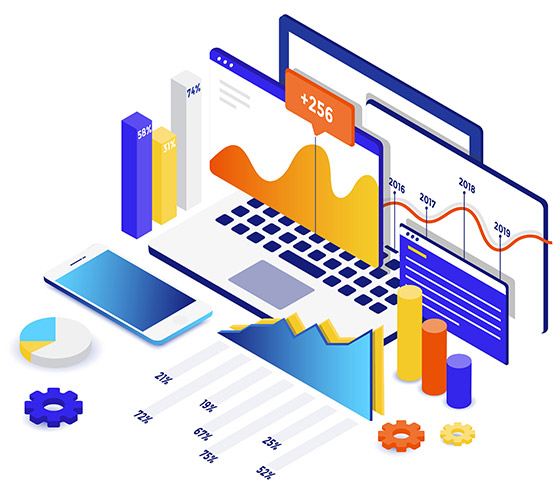Enterprise web application development services focus on creating scalable, secure, and customized software solutions designed to meet the complex operational needs of large organizations. These applications streamline business processes, improve efficiency, and support long-term growth by integrating with existing systems and leveraging modern technologies like AI and cloud-native architecture.
They provide tailored solutions that address specific business challenges, helping enterprises modernize legacy infrastructure and enhance workflow automation. This targeted approach ensures businesses can adapt quickly to changing market demands while maintaining operational stability and security.
By combining advanced development methodologies with a deep understanding of organizational requirements, these services deliver applications that offer robust performance and seamless user experiences. Enterprises rely on these solutions to optimize resource management and drive measurable return on investment.
Key Elements of Enterprise Web Application Development Services
Enterprise web application development services focus on delivering tailored software solutions that align with business goals. They prioritize robust design, efficient performance under heavy loads, and seamless connection with existing enterprise systems.
Custom Solution Design
Custom solution design addresses the unique needs of the business by creating software tailored to specific workflows and processes. It involves detailed requirement analysis followed by architecture planning that ensures modularity and easy maintenance.
The design phase incorporates secure access control, user roles, and compliance with industry standards. It balances functionality with usability, ensuring the application supports both internal teams and external partners effectively.
Custom design also allows flexibility for future feature expansion. It avoids one-size-fits-all models by integrating business logic directly into the application structure, delivering precise tools that improve operational efficiency.
Scalability and Performance Optimization
Scalability ensures the application can handle growing numbers of users and increasing data volumes without degrading performance. This is crucial for enterprises anticipating business growth or fluctuating workloads.
Performance optimization includes load balancing, efficient database queries, and caching mechanisms. These techniques minimize latency and maximize responsiveness under high traffic conditions.
Developers often use cloud-native architectures and microservices to enhance scalability. These approaches enable independent scaling of different components, improving resource use and fault tolerance.
Integration with Enterprise Systems
Integration connects the web application with existing enterprise software like ERP, CRM, and HR platforms. This seamless data exchange avoids silos and enhances overall business process automation.
APIs and middleware are commonly used to facilitate secure, real-time communication between systems. Integration efforts prioritize data consistency, preventing duplication or conflicts across platforms.
Effective integration increases visibility into operations by consolidating data sources, enabling better decision-making. It also supports workflows that span multiple departments or external stakeholders efficiently.
Benefits and Strategic Value of Enterprise Web Application Development
Enterprise web application development delivers practical advantages that support business stability, efficiency, and ongoing adaptability. These solutions focus on securing data, automating repetitive tasks, and ensuring continuous functioning through dedicated support.
Enhanced Security Measures
Enterprise applications incorporate multiple layers of security to protect sensitive company data and customer information. This typically includes strict user authentication, role-based access controls, and data encryption both at rest and in transit.
They often integrate with existing corporate security frameworks, such as identity management systems and secure gateways. Regular security audits and compliance checks are embedded into the development process to reduce vulnerabilities.
By designing security protocols specifically for enterprise needs, these applications prevent unauthorized access and data breaches, thereby reducing risks and potential financial loss.
Business Process Automation
Automation within enterprise web applications streamlines workflows by digitizing repetitive and time-consuming tasks. This reduces human error, speeds up operations, and frees up employees to focus on higher-value activities.
Typical automated processes include inventory management, order processing, and employee onboarding. Integration with other business systems ensures end-to-end task completion without manual intervention.
The result is improved operational efficiency, faster service delivery, and consistent output quality, which positively impact overall business performance and customer satisfaction.
Long-Term Support and Maintenance
Enterprise solutions are designed for durability and scalability, requiring ongoing maintenance to adapt to evolving business needs. Regular updates address software bugs, security patches, and performance improvements.
Dedicated support teams provide monitoring, troubleshooting, and critical system upgrades, ensuring minimal downtime. This long-term care protects the initial investment and allows businesses to respond quickly to new requirements.
Continuous maintenance also helps in aligning the application with changing industry standards and regulatory requirements, maintaining compliance over time.


Leave a Reply